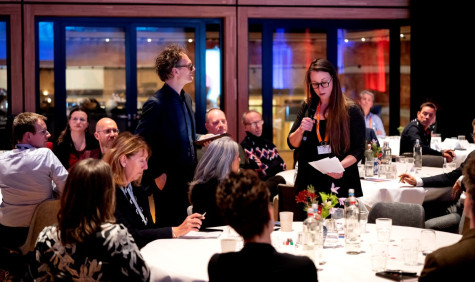Open source: crucial at the board table, but who takes the lead?
Open source is not just another technology. It is an essential tool to safeguard public values such as autonomy, transparency and collaboration. This became clear at the Open Source Leadership Summit, where Nathan Ducastel, board member of VNG Realisatie, made an urgent appeal: take open source seriously at the board table.
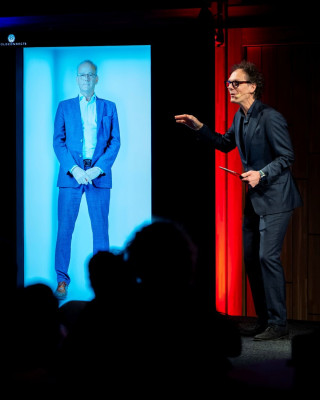
State Secretary Zsolt Szabó, addressing attendees via a hologram, and chairman of the day, tech expert and former long track speed skater Ben van der Burg.
Dependence on digital technology is growing. Open source offers answers: it helps increase our autonomy, provides transparency and breaks down walls between organisations.
It is not an optional extra, but a strategic tool that enables good governance and innovation. This was emphasised by State Secretary Zsolt Szabó, who addressed attendees via a hologram: "Open source is a legal requirement for government; it is time to really take that step."
Key insights
During the Open Source Leadership Summit, an initiative of the Ministry of the Interior and Kingdom Relations and SURF, some 130 decision-makers and board members from the public domain met in Naturalis to gain knowledge and motivate each other. Several experts shared their insights.
"So many perspectives were shared; my understanding of open source grew through the many spikes of information gathered from all sides."
Besides Ducastel, other leaders also spoke:
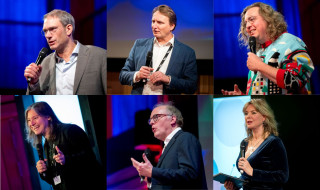
From left to right: Nathan Ducastel (VNG), Ron Augustus (SURF), Bob van Luijt (Weaviate), Melanie Rieback (Radically Open Security), Dirk-Willem van Gulik (Apache Software Foundation) and Jacqueline Rutjens (RDDI)
- Ron Augustus (SURF) stressed the importance of autonomy: "If we don't understand technology, our dependency increases." So we should not only be concerned with applications, but also with the development of technology itself.
- Bob van Luijt (Weaviate) explained how market forces in open source ensure better software. Also read the SURF Story with Van Luijt: "The time of top-down purchasing of IT solutions is over."
"Learned a lot from the views of people active in the community, such as how organisations around open source can arrange ownership."
- Melanie Rieback (Radically Open Security) warned against freemium models: "Open source is nice because it's free, but needs a good business model that should be asked for in tenders." Also read the SURF Story with Rieback in which she illustrates, "What you spend your money on shapes the world you want to build."
- Dirk-Willem van Gulik (Apache Software Foundation) praised the power of knowledge sharing through open source, in which you create exactly what you need without loss.
- Jacqueline Rutjens (RDDI, National Programme for Sustainable Digital Information Management) presented the Opensource Works community and the Standard for Public Code.
"That we need to put open source more into practice has become very clear. And encourage collaboration, because by being open with each other, you work together on quality and make greater impact."
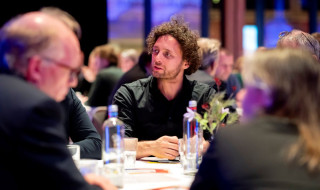
Karim El Assal of TNO and GPT-NL "Data donations for GPT-NL are still very welcome".
All experts agreed: the power of open source lies in collaboration. A good example of this is the GPT-NL project, in which various parties are working together to help the Netherlands advance technologically. As Karim El Assal (TNO) put it, "It's all about integrity and reproducibility. Working together makes it possible to create big impact with limited resources."
Lessons from the keynotes
In addition to motivation and inspiration, it became clear during the summit that board members and leaders need to take concrete action on open source. The main action points that emerged were:
1. Strengthen understanding and knowledge among board members: many decision-makers are not yet fully aware of what open source entails or can mean. Education, research and governments are already using open source tools, such as eduroam and OpenConext, but a broader approach is needed.
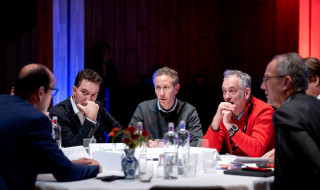
Table discussion at the Open Source Leadership Summit
2. Regulate sustainable management: management of open source should be explicitly included in tenders to ensure continuity and quality.
3. Create innovation budget: structural budget is needed for digital autonomy and long-term investment in open source technologies.
4. Institutionalise open source within organisations: an Open Source Program Office (OSPO) is essential to properly organise and manage open source.
Conclusion: time for action
Making open source really work requires leadership. This starts with board members who no longer see open source as a choice, but rather as a strategic priority. Only then can we safeguard public values and realise digital autonomy.
Read more about how open source strengthens public values in Open Source Magazine (in Dutch).
Text: Maureen van Althuis and Evelyne Hermans
Photos: De Beeldredaktie
'Open source: crucial at the board table, but who takes the lead?' is an article from SURF Magazine.
Back to SURF Magazine
Questions following this article? Mail to magazine@surf.nl.
